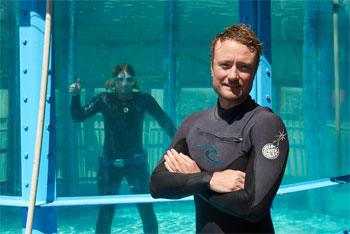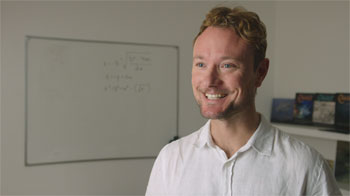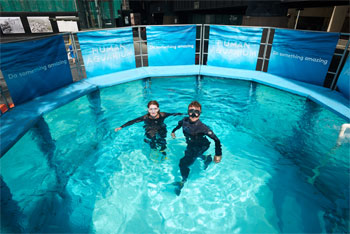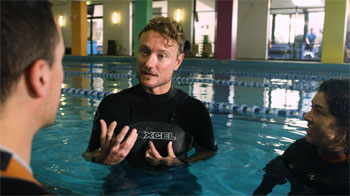James Fletcher Harness the Power Of Breath Into 2018

What Is the Science Behind The Power Of The Breath?
As another New Year's creeps up, we feel motivated to dive into another 28-day challenge or new juice cleanse. However, year-after-year most people will neglect improving their overall health and performance long-term: including decreasing their anxiety, altering their work routines, or even working to quit bad habits, like smoking.
James has recently worked with three ex-smokers who quit with Nicorette, training them to participate in a Human Aquarium - showcasing the amazing power of the breath.
 Interview with James Fletcher
Interview with James Fletcher
Exercise physiologist and physiotherapist James Fletcher has pioneered breath training programs for Cirque du Soleil, the Australian Institute of Sport and the Australian Olympic Swimming team. Six years in the making, James is now applying his breathing techniques to the everyday Aussie, developing a breath training program that can increase exercise performance, reduce anxiety and even help people quit smoking.
Question: Why do you feel people neglect their health as the year ends?
James Fletcher: As an Exercise Physiologist, this time of year can become very challenging from a pure time management point of view. Often our health if the last thing on the to do list when we have friends and family in town, Christmas shopping, kids on holidays and we actually have to make time and conscious decisions to manage our health and exercise at this time of year. Present bias is an interesting Behavioural economics model which unpacks this behaviour well and I would love to get into more detail on another blog.
Question: Can you tell us about the breathing training you practice and teach?
James Fletcher: As a scientist and health professional I scoured the research to find a suite of techniques that people with respiratory illness such as COPD and Asthma can use to improve their health. As it turns out, these techniques with some modification, work really well for everyday people to improve their health all the way up to elite level athletes looking to improve their performance. I have trained over 400 therapists worldwide and have treated over 1450 patients in my clinics in Australia.
Question: What's the science behind this concept?
James Fletcher: Science: Fletcher techniques is proven to make the breathing muscles stronger which makes breathing easier. The research shows if we can build a stronger diaphragm and breathing muscles, we improve our exercise performance, reduce our shortness of breath and improve the control of our breath which can have a dramatic impact on stress control, anxiety and help with quitting smoking.
 Question: How has this breathing technique been used for Cirque du Soleil?
Question: How has this breathing technique been used for Cirque du Soleil? James Fletcher: Working with elite Circus athletes on the breath from high wire athletes, wheel of death athletes and acrobats, there are 2 clear outcomes we achieve. Firstly, we reduce the shortness of breath during the act so performers can increase their concentration levels and improve their artistic performance. Secondly, they do not feel as tired during and after their act, as their breathing muscles do not become fatigued and allow the exercising muscles improved blood flow.
Question: Is this a breathing technique everyday Australians can use when exercising?
James Fletcher: Generally speaking, everyday Aussies may not be exercising at the correct intensity level required for change. Most of the time it is the out of breath feeling that stops most people from achieving this and Fletcher techniques reverses this within 2 weeks.
Question: Does this technique aid in decreasing anxiety? How?
James Fletcher: One of the techniques we use to control anxiety is called 1:2, which is where participants breathe in for 5 seconds and breath out for 10 seconds. We double the length of the breath out, this long expiration helps retain some CO2 levels, helps reduce heart rate and delivers control to an individual who is in that anxious state. Some popular breathing techniques in the media actually teach the reverse process, to over breath, to reduce the CO2 levels in the body which is the wrong way to treat anxiety.
Question: How does Ryan Hipwood successfully use this breath technique?
James Fletcher: Ryan has undertaken many forms of breath training in the past, his life depends on it. Surfing 40+ foot waves, you need to be able to control anxiety, take large volumes of air in short amounts of time, and hold your breath under stressful situations. We have been working with each other to achieve these goals and have recently partnered up to show other athletes and executives what they can achieve.
Question: Can you share the success stories of using this breathing technique for helping people quit smoking?
James Fletcher: My mother was a long term smoker, and now suffers from emphysema. I want to change the way we look at the quitting process, no more cravings, no more weight gain and irritability. Let's do something amazing! Fletcher techniques allows Ex-smokers to get their breath back, rehabilitate their lungs and control the anxiety associated with quitting smoking. Recently we took 3 everyday Aussies through the program, one of the participants wanted to become a positive role model for his children and his smoking was the biggest thing in the way, his young son started emulating his smoking using a pencil. After 4 weeks of the program, he is now taking his family on a holiday to Fiji to snorkel the reefs with his improved breathing, energy and vitality.
 Question: What inspired your passion for exercise?
Question: What inspired your passion for exercise? James Fletcher: I was an overweight teenager and couldn't keep up with my friends. My mission in life is to have as much fun as I can and help as many people with their health as possible. To do this I need to be fit enough to enjoy life, go hiking, swimming, surfing and enjoying the amazing things we have here in Australia. I also want to be a positive role model for my friends and family, and also my clients who sometimes are struggling with the many life pressures they have.
Question: Do you have a morning routine? Can you share this with us?
James Fletcher: My morning routine comes from my work as a Sleep Health professional, and understanding the importance of good quality sleep. I use a Sleep app which helps me determine the best time to wake up in my sleep cycle, when that alarm goes off, I don't hit snooze! The second most important thing to help wake up is sunlight and whole body movement, this is as simple as opening the curtains of my lounge-room and doing the Fletcher techniques wake up routine. It takes 5 minutes and involves some deep breathing and an all body stretch routine, also a coffee.
Interview by Brooke Hunter
MORE



